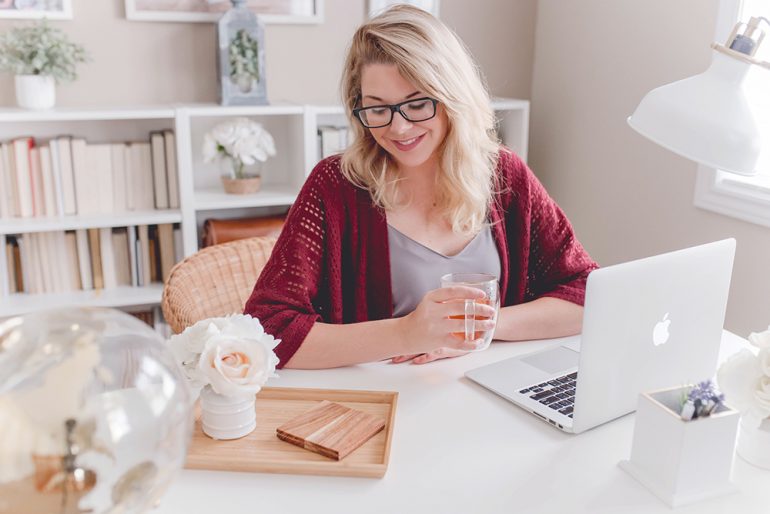How busy are you really? Jo O’Donovan shares her best tools to enable you to free up our most precious commodity – time.
~
Jo O’Donovan from workplacerelationships.com.au, works with businesses and coaches individuals on the harm of stress and why doing less is actually more productive. She has developed a Laser Coaching program that helps clients achieve results from 15-minute focused coaching sessions and is an Accredited Strengths Profile Assessor. Jo’s featured as an expert in our November issue of Get it, and she’s shared bonus material to help us all find our way through the sea of contemporary ‘busy’…
How busy are you really?
The first thing I suggest to clients when we spot they’re stuck in the ‘too busy’ mindset, is for them to GET REAL.
Are you really as busy as you think you are? Most of us aren’t because we are wasting time and don’t even know it! So I always get a client to complete a time audit over at least a week (ideally two) and log everything they do…from brushing their teeth, chatting to a friend, going to the gym to using the toilet (often the toilet and phone!) work, office gossip etc.
When we know where we are choosing (choosing is a very important word) to spend our time, then we can make decisions about any needed changes.
From here, you should colour code:
1. What you cannot change – if you have fixed work hours, the length of commute, kids activities involving you, anything dictated by others that are set in either length or time.
2. What you can instantly stop doing – where are you wasting time?
Are there things you hate doing that you could get someone else to do?
For example, get groceries delivered, get a cleaner, carpool with other parents, allocate tasks to a co-worker or partner? You need to be real about allocating tasks to others.
They may not have your ‘standard’ or do it in your way, so decide if ‘good enough’ is ok for this before the change; communicate expectations and then LET THEM GET ON WITH IT.
We often try to take things back because our ego tells us we are better, however, this will not gain you more time and that is what you are trying to do.
3. What you can or want to reduce – this is usually domestic tasks, social media, Netflix binging etc.
This is where the magic happens – we now get to see where we waste time, we may see that we spend as much time on something we don’t value as something we highly value.
“Do I really spend more time on social media as I do talking to my life partner?”
Get routines and habits developed so less brain power is involved for the mundane tasks.
For example, Monday night I get laundry washed, Wednesday I iron while watching ‘trash TV’- which I used to watch anyway while flicking through Instagram. This way I get something done that is needed, while allowing myself a guilty pleasure of watching a program I would never admit to watching!

Top 3 tips for prioritising
Here’s a guide on how to sift through what’s urgent or not:
Run your day on your terms
There are loads of books about setting up your morning, workplace etc. so YOUR priorities are met first. I love Mel Robbin’s The 5 Second Rule and her planner of the same name, or The Miracle Morning by Hal Elrod.
In a nutshell, they show you how to start your day so that YOUR biggest priorities are dealt with before you address others.
So, plan one thing you want to achieve that day and recognise why that is important. Most people work best in these first few hours so make sure you use it for meaningful, productive work – where you can get into a state of flow.
Turn off notifications for emails and apps. Set a time that works for you. I start work around 9am and focus on my priorities for the first two hours minimum. Then I’ll check emails and respond to other people’s agendas and needs.
That way, if my day starts to become hijacked or take an unplanned direction, I’ve completed (or achieved enough of) my top task in those two hours before any distractions happened.
Make an arrangement with family that you are unlikely to be contactable before a certain time (unless an emergency), so text or leave a message and you can answer when you can.
Create a good network around you for support
We are not designed to live or work in isolation.
Develop relationships with people who you can get to support you and vice versa.
Delegate wherever you can – ask for help and sincerely thank people when they do help, even if it’s not quite done your way.
Over time, you will learn to accept that often, good enough is actually awesome if it means you never have to think about or do it yourself!
If you over-function all the time, others will under-function to allow you!
Be present no matter how you are spending your time
When you are at work – get the work done.
Prioritise doing nothing (or not much) and remind yourself that it is not just OK, but necessary to slow down your mind for it to work and rest properly.
If you are spending time with your family, turn off the phone and be present and enjoy that time.
A personal example of this was once I had agreed to play golf with my husband one morning as he wasn’t working that day. I had no problem with playing golf, he was kindly teaching me – but I simply didn’t want to do it then! I was snapping and thinking of all the things I felt I should be doing instead: “How long will this take? I need to do other things”.
I was frustrated with myself for agreeing to do this in a morning instead of evening, and was tense because this was ‘getting in the way’ of my work priorities.
However, I was in the car travelling to the golf course as I’m feeling all this. It was happening, so my choices were to continue moaning, not enjoy it, still spend the time at the golf club and probably cause an actual argument…or embrace it and enjoy the fact that I was getting to spend some time with my husband on a beautiful sunny morning, getting some coaching tips whilst it would be quiet at the club and recognise I could easily focus on the work stuff fully later in the day.
As it turned out, I explained that whilst I wanted to do the golf, work was playing on my mind as I felt the project I was working on would take longer than originally anticipated, hence my being snappy.
We decided to play only 9 holes instead of the full 18 to give me some extra time and I focused fully on the golf until after we had finished.
It was such a lovely morning spending some time together – once I was fully present!





